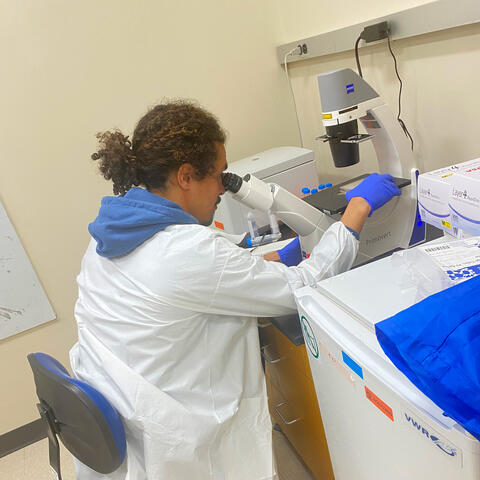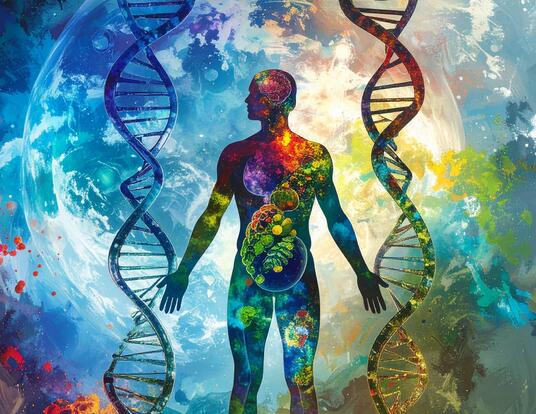Stroke of Genius
Kozlowski overcomes life and death challenges on his way to the frontiers of chemistry
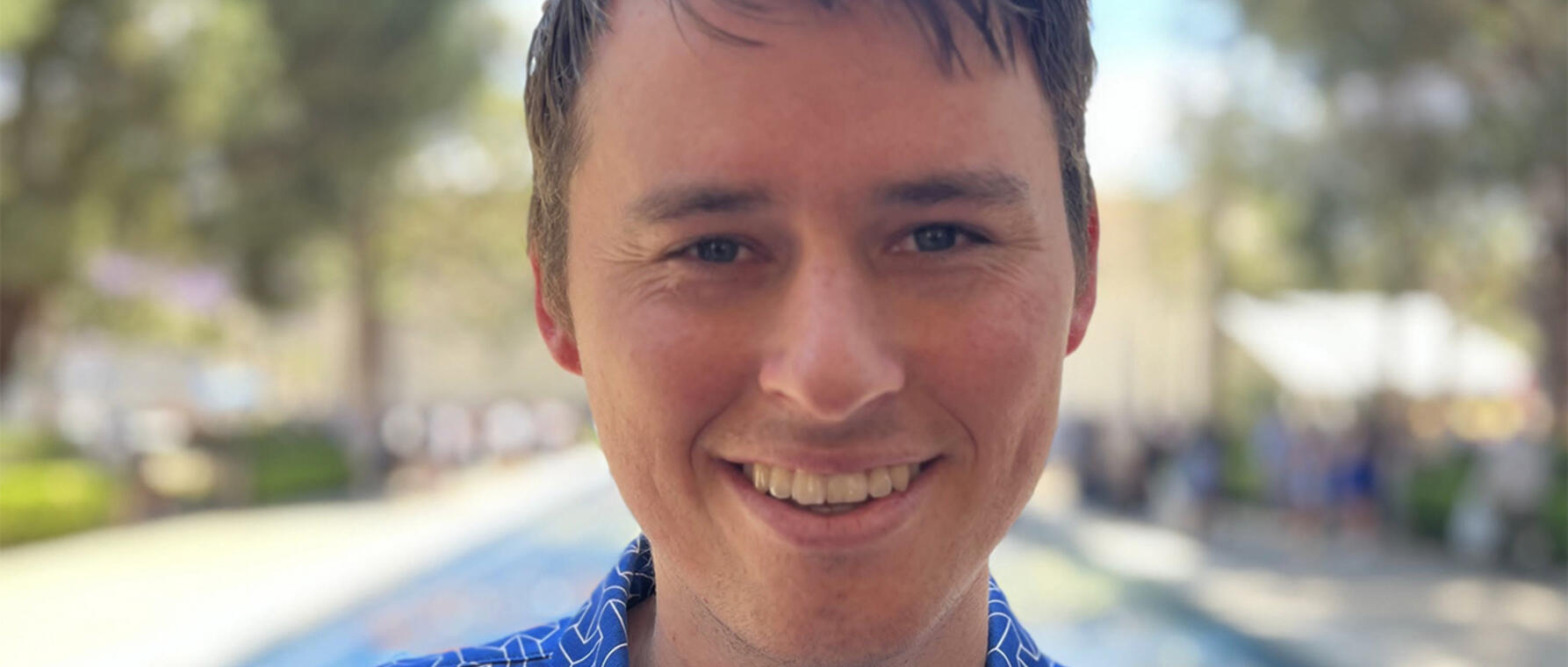
Patryk Kozlowski was finishing his fall exams as a junior at the California Institute of Technology (Caltech) when he learned he had leukemia. A young athlete and a burgeoning scientist, Kozlowski was stunned. Only weeks later, though, he faced even greater challenges.
“I had a stroke after I began taking immunosuppressant drugs that were part of the leukemia treatment. It was the result of a fungal infection that set in,” he says. “In the days after, I was unable to pull myself up or down in my hospital bed. It took months just to learn how to transfer to a wheelchair.”
In the years since, Kozlowski has steadily pulled himself up—first to Caltech, then to his undergraduate degree, and finally all the way to the Harvard Kenneth C. Griffin Graduate School of Arts and Sciences. Today, as a PhD student in chemistry and chemical biology, he studies theoretical science that could one day lead to the next generation of renewable energy. He says the lessons learned during his recovery from illness and injury have made him a better researcher.
Sports and Science
One of the cruel ironies of Kozlowski’s leukemia and stroke is that sport—tennis in particular—was at the center of his life growing up in Southern California. His parents never played tennis in their native Poland, but fell in love with it after emigrating to the United States in the 1980s, when their home country was suffering under economic recession and martial law.
“When my older brother and I were young, our parents started having us play tennis,” Kozlowski remembers. “Growing up, I played on the junior circuit. I played for my high school team, and then for Caltech, a Division III school.”
Kozlowski’s parents also supported his interest in science, which developed through advanced placement classes in high school. Inspired by the proximity of NASA’s nearby Jet Propulsion Laboratory, he entered Caltech intending to become an engineer. His plans changed after he took the school’s freshman chemistry course.
“I got really interested in the physical aspects of chemistry,” he says. “That’s what led me to do a freshman summer research experience in the chemistry lab. I became the first author of a study published in the Caltech Undergraduate Research Journal.”
Surreal
In the fall of 2020, during the COVID lockdown, Kozlowski developed Bell’s palsy, which weakens or paralyzes the muscles on one side of the face. His doctors treated the condition without performing blood work. A few weeks later, while on a hike with his family, Kozlowski was felled by a sharp abdominal pain he assumed was appendicitis, and rushed to the hospital. There, lab work revealed his white blood cell count had skyrocketed, a telltale sign of leukemia.
It was three and a half months before I could walk at all, even with a walker. I started to realize that it would be a long, slow process.
—Patryk Kozlowski
“I mean, it was kind of surreal,” he says of discovering, in his early twenties, that he had a life-threatening illness. “I continued with school in the winter after I got diagnosed, though with a reduced course load. Honestly, it helped when I started treatment. It was good for my mental health to focus on work.”
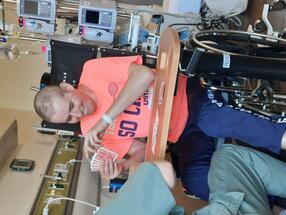
Therapy for leukemia included drugs designed to suppress Kozlowski’s immune system. As a result, he developed a fungal infection, typically harmless to people with a normal immune response.
“The fungal infection started in my bloodstream, I guess, and eventually it crossed the blood-brain barrier, went into my brain, and caused the stroke.”
An optimist by nature, Kozlowski believed his future remained bright even after the leukemia diagnosis. The stroke was a more sobering experience.
“It was three and a half months before I could walk at all, even with a walker,” he says. “I started to realize that it would be a long, slow process.”
On medical leave from Caltech, Kozlowski dedicated himself month after month to recovering from both leukemia and the stroke that had robbed him of his mobility. After two grueling years of chemotherapy and rehabilitation, he was ready to return to school in 2023—just as AI tools were entering the public sphere, as evidenced by the emergence of ChatGPT. Kozlowski says these new tools helped make it possible for him to finish his degree.
“In addition to the programming I do, I also type my analytical derivations in a computer language called LaTeX,” he explains. “My fine motor skills—the kind that enable you to use a keyboard—are impaired because of the stroke, so I use a combination of AI tools, like the coding assistant GitHub Copilot, and also dictation software, to complete these tasks efficiently. Without these tools, I would not have been able to return to academics as fast after my stroke as I did.”
Resilience and Brilliance
Now at Harvard Griffin GSAS, Kozlowski continues to recover even as he works toward his PhD. In remission from leukemia, he is still followed closely by an oncologist. (“The healthcare in Boston was 100 percent part of my decision to come to Harvard,” he says.) In general, though, his prognosis is very good.
“I’ve gone a few years now without a relapse,” he says. “That’s a very, very good sign.”
The same is true for his recovery from the stroke, though that process is long and slow. Because he is still relatively young, doctors say his brain can build new connections and heal from the damage. Kozlowski is optimistic that he will one day regain most or all of his former capacities.
“Currently, I use trekking poles to get around, but the hope is that if I continue my physical therapy, maybe in a few years’ time, I’ll be able to run again,” he says.
While Kozlowski is only entering the second year of his PhD program and his work is mostly theoretical, its long-term real-world impact could be significant. He likens it to the materials equivalent of the Human Genome Project.
“Mapping out the human genetic code enabled the design of new drugs and therapies targeted to specific genetic mutations,” Kozlowski says. “Similarly, if we understand the processes occurring in materials better—which I try to do by developing computational methods to model these materials—we can design more efficient solar panels or longer-lasting batteries. So, as the Human Genome Project advanced human health, this materials genome project will advance planetary health.”
If we understand the processes occurring in materials better—which I try to do by developing computational methods to model these materials—we can design more efficient solar panels or longer-lasting batteries.
—Patryk Kozlowski
Earlier this year, Kozlowski’s resilience and brilliance were both recognized when he was named a 2025 Paul & Daisy Soros Fellow. The award, which “supports one to two years of graduate study in any field and in any advanced degree–granting program in the United States,” honors immigrants and children of immigrants who “have the potential to impact tremendous change and innovation across society, culture, and academia.”
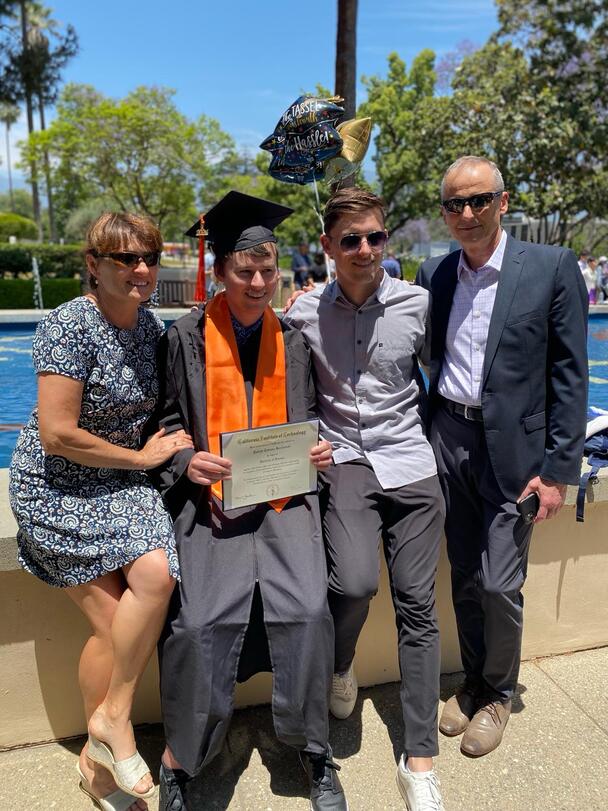
A Hard Taskmaster
Still, Kozlowski has good days and bad. When he hits a wall, he says his adviser, Professor Joonho Lee, is supportive while enabling him to move beyond his limitations.
“Part of the reason that science at Harvard is so good is because the principal investigators are very demanding,” he says. “Joonho Lee is no exception, but he understands I’m still getting better. He challenges me—but in a way that enables me to do things that I formerly thought would be impossible.”
Lee says he doesn’t “see or treat Patryk differently from the other students in my group,” a testament to the student’s resilience. “Despite his daily motor challenges, Patryk has achieved a level of independence and resilience that allows his research productivity to stand out as outstanding,” he says. “Ultimately, what sets him apart is not his circumstances but the quality of his work and the promise he shows as a scientist—attributes that I know our University values most highly.”
As the academic year begins, Kozlowski is eager to start a fall-term class on electrocatalysis—boosting chemical reactions using electricity and a catalyst that isn’t consumed in the process. Most of all, he is excited about the opportunity to pass knowledge along to others, which he will do as a member of the teaching staff for the undergraduate course Foundations and Frontiers of Modern Chemistry: A Molecular and Global Perspective.
Ultimately, what sets [Kozlowski] apart is not his circumstances but the quality of his work and the promise he shows as a scientist—attributes that I know our University values most highly.
—Professor Joonho Lee
Looking ahead, Kozlowski will continue his rehabilitation. (He’s learning to play ping-pong to improve his hand–eye coordination—a first step, perhaps, toward getting back on the tennis court.) Recovery from stroke and leukemia has been a hard taskmaster, but the lesson of patience it has taught is one that resonates throughout his life—particularly in his work as a scientist.
“Initially, I thought I would get better quickly,” he says. “Very soon, I realized that I could improve, but only incrementally, through diligent rehab. Through that process, I became very methodical. I carry that same attitude into the way I do research today: very methodical.”
Get the Latest Updates
Join Our Newsletter
Subscribe to Colloquy Podcast
Simplecast


